What Not To Do While Trying To Get Out of Debt

If worrying about how to pay off debt keeps you awake some nights, late-night television abounds with alleged solutions. Some ads even promise to get rid of your debt for "pennies on the dollar."
Check Out: 19 Effective Ways To Tackle Your Budget
Learn More: 50 Easy Things You Should Do To Save Money
Fall victim to these "deals" and you might be left with worse financial troubles than before. But these aren't the only foolish ways of paying off debt. Financial experts shared some common mistakes people make while trying to get out of debt -- avoid making these same missteps.

1. Not Having a Reasonable Debt Repayment Strategy
When sitting down to tackle your debt, the first step should be to see how much total debt you actually have. Add up any debt you have accrued from student loans, car loans, credit cards, medical debt, home equity loans, payday loans, personal loans and IRS and government debt. If you've been dealing with debt for a while, this might add up to a scary number that could leave you feeling overwhelmed, and you might feel like you don't know how to even begin paying it back.
Read More: 30 Ways To Dig Yourself Out of Debt

Why This May Be a Mistake
When you don't have a clear debt repayment plan, your instinct might be to try to cut back on spending, save more and earn extra money until you've saved enough to pay back your debt all at once. However, if you are just making the minimum payments throughout this time, you'll be accruing more interest all along.
Aim to consistently pay down your debt every month. Whether you want to tackle the highest-interest debt first or the smallest bill, know what your plan is and how you can achieve your goals.
See: 17 Steps Millennials Can Take Now for a Brighter Financial Future

Does It Ever Make Sense To Pay Down All Your Debt at Once?
In many cases, paying off all your debt at once is impossible, so having this as your goal will only set you up for failure. However, if you've recently received a bonus, tax refund or another cash windfall that can eliminate -- or at least pay off most of -- your debt, this is a great way to use that money.
Paying off debt as quickly as possible will lower the interest you have to pay and also will improve your credit score.
Get Started: Easy-to-Use Budgeting Templates
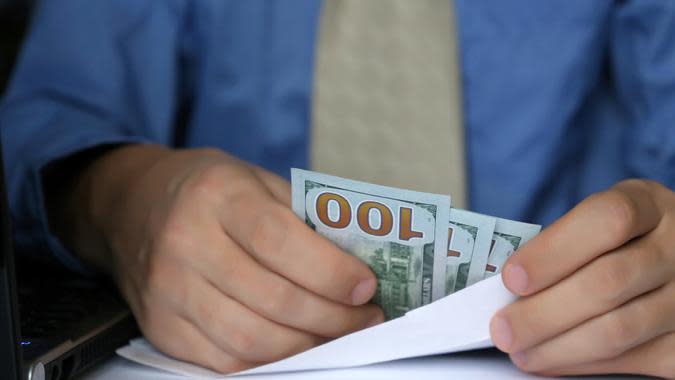
2. Taking Out Payday Loans
If your car or house payment is due before your next paycheck, a payday loan can seem tempting. With a payday loan, the lender gives you the cash you need, and you write a check for the amount you're borrowing, plus a finance fee.
However, the check is not cashed right away. Instead, you pay it off in full at your next paycheck.
Read: 6 Splurges That Save You Money in the Long Run

Why This May Be a Mistake
As payday approaches, you might run into worse financial trouble. Not only are other bills due, but you've also got a high-interest loan on your back. Suddenly, you're tempted to take on a second payday loan to pay off the first. And if you can't pay, you might roll over to a higher-interest installment plan that can exceed 400% annually, according to the Consumer Federation of America.
You might have authorized the loan company to take money out of your bank account to pay the loan. As the lender extracts fees, you could end up defaulting on your other financial obligations because your cash reserves are depleted.

Do Payday Loans Ever Make Sense?
About 20% of payday loan borrowers default, according to the CFA. Even worse, more than half of online payday installment loan sequences default. That means the odds definitely aren't in your favor.
A smarter way to deal with your debts could be using a personal loan to consolidate them.

3. Using Home Equity
Finding yourself cash poor and equity wealthy makes it tempting to use your home's appraised value to pay off debt or other financial obligations. The debt gets wrapped into a loan or line of credit for which you pay less interest than you would on a credit card. That frees up more money each month.
Ways to use your home's equity to pay off debt include:
Mortgage refinance
Home equity line of credit (HELOC)
Home equity loan
Reverse mortgage

Why This May Be a Mistake
Paying down credit cards using your equity frees up money each month and creates more room to spend on your credit cards. That seems like a good thing at first glance. But if you haven't corrected the spending, budget and income issues that got you in debt in the first place, you'll wind up in the same boat -- and possibly in much deeper water. This time, you won't have the equity to bail you out.
Credit card debt is unsecured. Fail to pay the debt, and the lender has relatively few options to collect. But paying off debt with your home equity means the debt is now backed by your home. Fail to pay, and your home could be at risk.

Does Using Home Equity Ever Make Sense?
Save home equity loans for reinvesting in your property through major home improvements that might increase its overall resale value down the road.
Reno: 30 Ways To Upgrade Your Home Without Blowing Your Budget

4. Heading To the Pawnshop
Taking jewelry, electronics or other valuables to the pawnshop can get you money now so you can catch up on debt payments. The process requires no credit check and the pawnshop holds your items for collateral until you repay the loan. All you have to lose is your property if you default.
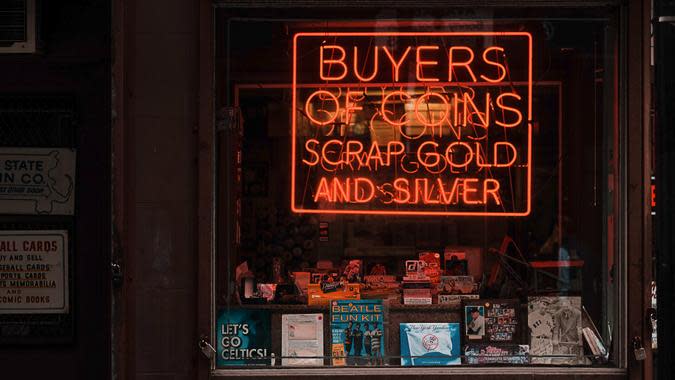
Why This May Be a Mistake
The amount of money you'll net for your items might disappoint you. Expect to get a percentage of what your item is actually worth in its present condition because the pawnshop has to cover its costs should you default.
In addition, loan interest rates can be high. Also, pawnshops must report every transaction to law enforcement -- so be sure those bikes you picked up off Craigslist weren't stolen before you pawn them.
If you're not able to come up with the money by the loan's due date, you risk losing valuables at a small fraction of their cost. You'd be better off selling items online or at a garage sale.

Does It Ever Make Sense To Pawn Your Possessions?
If your only other options includes a payday loan , this may be your best bet. All you have to lose is the property you're pawning, not your wages or car.
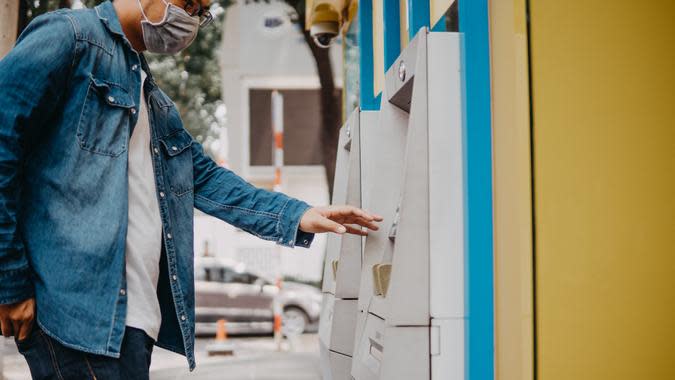
5. Taking a Credit Card Cash Advance
When you're short on your mortgage, car or automatically debited payments, you might be tempted to make up the difference with a cash advance. That's especially true if it means avoiding late fees, bank returned-item fees and bad reports on your credit history.
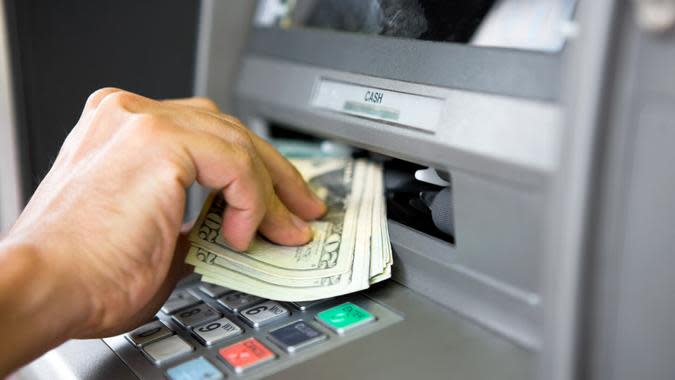
Why This May Be a Mistake
You will likely pay a cash-advance fee. You should also expect to pay a higher interest rate on the amount of your cash advance. Oh, and did you know that interest starts accruing the moment you take out an advance?
A cash advance is one of the most expensive types of credit transactions. Credit card companies are in the business of making money, so they often apply your monthly payments toward your lower-interest debt first. Any money you apply over the minimum payment is then credited to the debt with the highest annual percentage rate, such as a cash advance. So if you only pay the monthly minimum, you'll continue paying the high-interest rate on the cash advance amount until the entirety of lower-interest purchase amounts gets paid off.
Discover: 30 Ways To Dig Yourself Out of Debt

Does It Ever Make Sense To Take a Credit Card Cash Advance?
Taking on more high-interest debt is rarely a good idea. And next month, you'll have a harder time paying off debt when the larger payment comes due.
Instead of using a cash advance through your credit card, consider smarter options that come with lower interest rates. A personal loan could provide you with the money you need at a better rate, which could lead to you saving hundreds or thousands in interest.
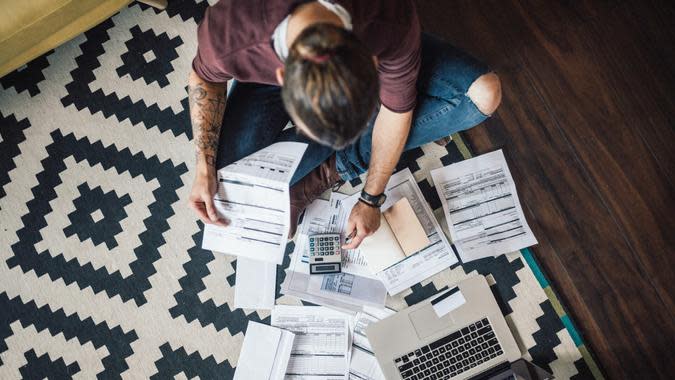
6. Using a Debt Settlement Company
Using a debt settlement company theoretically allows you to negotiate the amount of your debt with your creditors with the hope of paying just a fraction of what you originally owed. In addition, you'll simply make one easy monthly payment to the debt settlement company.

Why This May Be a Mistake
Lenders aren't under any obligation to accept less than they're owed, and some won't work with debt settlement companies. If they do let you pay less, your credit report will show that you didn't pay in full for the next seven years. That makes it harder to get your financial act together.
Debt settlement companies might encourage you to withhold payment from creditors during the negotiation process. But such a process can take up to 36 months, according to Debt.org. During that time, you'll rack up late fees and penalties on top of what you already owe. Add in a 20% to 25% fee paid to the debt settlement agency and the income tax you'll pay on the amount of debt forgiven.

Does It Ever Make Sense To Use a Debt Settlement Company?
Only use a debt settlement company as a last resort if you can't consolidate debt through any other means.
And definitely do your research before going this route. If you find a potential debt settlement company that you're interested in, check out what the Better Business Bureau says about the company, look at reviews and continue to explore other options.

7. Filing Bankruptcy
When you have far more debt than money to pay it, bankruptcy gives you a chance to start over. You might wipe out unsecured debt completely and even stop or delay foreclosure on your home or repossession of your automobile.
Best Banks: These Are the Best Banks of 2021 - Did Yours Make the Cut?

Why This May Be a Mistake
Filing bankruptcy is a long and stressful process that can take six months or more to complete. You must attend credit counseling and compile all your financial records before you can even file. Complicated laws surrounding bankruptcy are best faced with an attorney at your side. Even if you "win" your petition, you still lose: The bankruptcy stays on your record for up to 10 years and can make establishing new credit -- or even renting an apartment -- difficult.
In addition to being a financial pariah for the next decade, you'll lose nonexempt assets you own, such as bank accounts, a second car, a vacation home, coin collections and stock investments.

Does It Ever Make Sense To File For Bankruptcy?
If you've tried debt consolidation and debt settlement but still can't eliminate your debt in five years or less, bankruptcy might be your best option, according to Debt.org. If you take this step, make sure you learn how to rebuild your credit.

8. Paying Student Loans, Mortgages and Auto Loans With Credit Cards
The notion here is to rack up credit card reward points by paying your student loans, mortgage or other large loan payments with a credit card. Even if your lender won't take credit card payments, you can employ the services of an intermediary payment service to convert a credit card charge to currency the lender will accept.
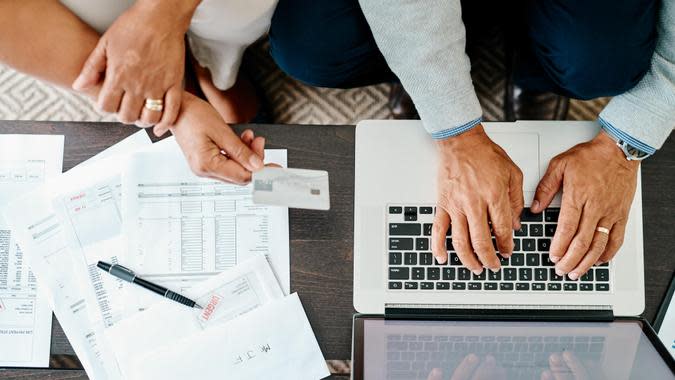
Why This May Be a Mistake
You pay a fee on each bill you pay using a credit card.
For example, if there's a 2.5% credit card fee, that doesn't sound like much. However, if your monthly debts include a $500 car payment, $1,120 for your mortgage and $280 toward your student loan, you'll shell out an extra $47.50 monthly. That's $570 per year that you could use to lower your consumer debt instead of adding to it. If you use payment intermediaries to pay your utility bills and other payments, you could create debt far faster than you're getting out of it.
Paying more interest than you need to is never a clever decision when you're trying to get out of debt.

Does It Ever Make Sense To Pay Back Loans With a Credit Card?
Never. Using your bank's bill-pay function to have checks sent to your mortgage company or student loan servicer is a much better move than racking up extra interest and more debt.

9. Joining a Multilevel Marketing Company
Joining an MLM company involves selling products to family and friends and recruiting other people to do the same. Most MLM companies allow you to make money two ways -- by selling products directly to customers and by recruiting new people to sell and earning commissions off the products they buy and sell.
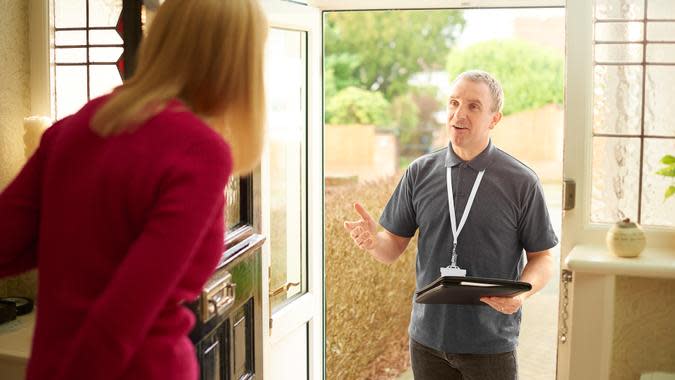
Why This May Be a Mistake
By joining what seems like a legitimate MLM, you might actually be signing up to be a part of an illegal pyramid scheme. Legitimate MLMs will pay you based on the products you sell, not on recruiting other members.
Even if an MLM is legitimate, it usually doesn't lead to the riches that the recruiter will say are possible to make with the company. You might end up buying more product than you can sell, which can leave you with more debt than you started off with.
According to the Federal Trade Commission, "Most people who join legitimate MLMs make little or no money. Some of them lose money. People who become involved in an illegal pyramid scheme may not realize they've joined a fraudulent venture, and typically lose everything they invest. Some also end up deeply in debt."

Does Joining an MLM Company Ever Make Sense?
If you have a knack for sales, a solid sales plan and can afford to lose money and time if the MLM venture doesn't work out, you might consider it -- but there are definitely better alternatives to make some extra cash to pay down debt.
Instead, consider working for a ride-hailing service. Or, if you're crafty, consider setting up your own online shop and selling what you make through there. There are plenty of other side gigs that can help you make money.
See: Tips To Keep Your Finances in Order Without Sacrificing What You Want

10. Continuing To Make Credit Card Charges
You might have made a commitment to yourself to focus on paying down your debt by spending less and saving more, but many people continue to put charges on their credit cards during this time.

Why This May Be a Mistake
When you continue to buy things with your credit card, you continue to rack up higher-interest debt -- which could cost you hundreds or even thousands of extra dollars in interest over time. The more debt you rack up, the harder it is to pay down.

Does It Ever Make Sense To Continue Using Credit Cards While Paying Down Debt?
If you're dealing with long-term debt, such as a mortgage or student loans, it's OK to keep using a credit card. But if you are specifically dealing with credit card debt, it's time to stop swiping. Make payments with cash or a debit card to prevent yourself from spending more than you have and racking up even more debt.

11. Stopping Your Contributions to Retirement and Emergency Funds
If you've decided to make paying off debt your priority, you might be tempted to funnel all your income toward necessary expenses and debt repayment and put a pause on contributions to your retirement savings and emergency savings.

Why This May Be a Mistake
Not contributing to your retirement savings now, especially if you are young, might not seem like a big deal. But you're robbing your future self of financial security.
And not contributing to an emergency fund can negatively impact your not-so-distant-future self. If you don't have three to six months' worth of living expenses saved up "just in case," you might be in even worse financial shape than your current debt situation if an unexpected event occurs.
If you do need to lower your retirement contribution amount while focusing on debt repayment, you should at least contribute enough to your 401(k) to get your employer match - otherwise, you're missing out on free money that can go toward your retirement.

Does It Ever Make Sense To Stop Contributing To Retirement or Emergency Funds?
If you already have a good financial safety net saved up in an emergency fund, it's OK to funnel your usual savings contribution toward debt repayment. Just make sure you are prepared for the unexpected.

12. Closing a Credit Account as Soon as You Pay It Off
Whether you choose to pay off debts from highest to lowest interest rate or smallest to largest amount, you might be tempted to close each account as soon as you are done paying it off.

Why This May Be a Mistake
Especially with credit cards, it's true that having fewer credit cards open can make it less easy for you to spend above your means -- but this seemingly smart move can end up raising your credit utilization rate. This is measured by the total amount of your balances divided by the total amount of credit you have available, so the fewer cards you have open the higher your utilization rate will be. Your credit utilization rate is one of the factors that is used to calculate your credit score.
Instead, keep your card open but be smart about how and when you use it. And always aim to pay off your monthly balances.

Does It Ever Make Sense To Close a Line of Credit?
If you know you won't be able to stop yourself from adding new debt to a credit card you've paid off, closing it could be worth it.
Before you close a card, make sure you have paid off all outstanding balances and fees, redeem any remaining awards, remove the card as a saved method of payment for any recurring payments and call your provider to formally close the account.
More From GOBankingRates
Gabrielle Olya and Jodi Thornton-O'Connell contributed to the reporting for this article.
This article originally appeared on GOBankingRates.com: What Not To Do While Trying To Get Out of Debt
